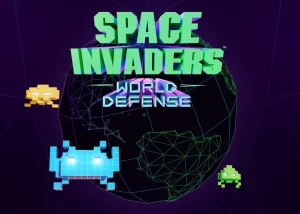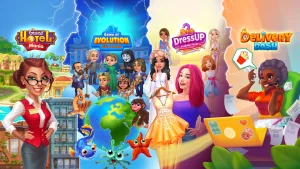Introduction
Video games have come a long way. What started as simple entertainment in arcades has grown into a huge industry that influences many parts of our lives. Today, video games are more than just fun—they affect culture, education, technology, and the economy. In this article, we’ll explore how video games have changed the world and why they matter today.
A Quick History of Video Games

Video games started in the 1950s, but they became popular in the 1970s with arcade games like Pong and Space Invaders. In the 1980s and 1990s, home consoles like Nintendo and Sega brought games into living rooms around the world. By the 2000s, video games were everywhere, and major companies like Sony and Microsoft turned gaming into a global industry. Today, you can play games on consoles, computers, and even your phone.
How Video Games Have Affected Culture

Video games have become an important part of popular culture. Iconic characters like Mario, Sonic, and Lara Croft are known worldwide. These games have created their own cultures, with players forming groups, sharing tips, and even competing in eSports. eSports are video game competitions where players compete for big prizes, and some people make a living from gaming.
Video game music is also popular, with orchestras now performing video game soundtracks at live events. These changes show how video games have become a major part of entertainment today.
Video Games and Education: Learning Through Play

Video games are not just for fun; they are also used in schools and colleges to help students learn. Games like Minecraft and SimCity let players build things, solve problems, and learn about subjects like architecture and city planning.
Teachers use games to make learning more engaging, a method known as “gamification.” It’s been shown that students learn better when they play educational games because they can see and interact with the material instead of just reading or listening.
How Video Games Are Changing Technology

Video games have driven many of the technological advances we use today. For example, they push for better graphics and faster computers. Gamers want realistic visuals, and this demand has led to huge improvements in technology.
In recent years, video games have also helped develop virtual reality (VR) and augmented reality (AR). VR lets you step into a video game world and experience it like never before, while AR adds digital images to the real world, like with Pokémon Go.
The Huge Impact of Video Games on the Economy
The video game industry is worth billions of dollars. As of 2024, it is expected to generate over $200 billion in revenue. This money comes from selling games, gaming consoles, online subscriptions, and merchandise. Video games also create jobs in development, marketing, and streaming.
In addition, events like the Electronic Entertainment Expo (E3) attract thousands of people and boost local economies. Even live-streaming platforms like Twitch, where people watch others play games, have become big businesses.
Social Impact: Connecting People Around the World

Video games connect people from all over the world. Online multiplayer games like Fortnite and Call of Duty allow players to team up or compete with others no matter where they are. This has created global communities where people can make new friends and share experiences.
Platforms like Discord have become popular places where gamers can talk, share ideas, and plan events together, showing how video games help people stay connected.
Video Games and Creativity in Game Design
Creating video games takes a lot of creativity. Game designers have to think of new ideas, design characters, and come up with interesting stories. This creative process is similar to making a movie or writing a book. Many game designers start as players themselves, using their experiences to design games that others will love. The constant need for fresh ideas makes the video game industry one of the most creative fields.
The Problems with Video Games: Violence and Addiction

While video games offer many benefits, there are some concerns. Some people believe violent video games can lead to violent behavior, especially in young people. Games like Grand Theft Auto and Call of Duty, which include violent content, have sparked debates about their impact.
Another concern is video game addiction. Some people get so involved in gaming that they ignore their studies, work, or relationships. In 2018, the World Health Organization (WHO) even recognized “gaming disorder” as a real condition. It’s important to find a balance between gaming and other aspects of life.
The Challenges of Video Games
Despite their benefits, video games come with challenges. Some games are violent, and people worry that playing violent games might affect behavior, especially in children. Another problem is video game addiction, where players spend too much time playing and neglect other responsibilities. It’s important for players to find a balance and not let gaming take over their lives.
The Future of Video Games

The future of video games looks very exciting. New technologies like virtual reality (VR) and cloud gaming are making games more immersive and accessible. Players will soon be able to play high-quality games without needing expensive consoles or computers. As technology continues to improve, video games will keep changing and becoming an even bigger part of our lives.
What’s Next for Video Games?
The future of video games looks exciting. As technology advances, video games will continue to improve. New developments in AI, cloud gaming, and VR will likely offer even more immersive and realistic experiences.
Cloud gaming, for example, allows people to play high-quality games on any device without needing a powerful computer or console. This could make gaming more accessible to everyone.
Comparative Table: Video Games in Different Sectors
| Sector | How Video Games Have Changed It | Examples |
|---|---|---|
| Culture | Created new icons, music, and communities. | Mario, Sonic, eSports |
| Education | Used to teach subjects and improve learning. | Minecraft, Kahoot, SimCity |
| Technology | Led to advances in graphics, AI, VR, and AR. | Oculus Rift, PlayStation VR, Unreal Engine |
| Economy | Created jobs, made billions, and boosted related industries. | Game development, Twitch streaming |
| Social Impact | Connected people globally, forming communities. | Fortnite, Discord, World of Warcraft |
| Controversy | Concerns about violence and addiction. | Grand Theft Auto, Call of Duty |
Analysis Table: The Influence of Video Games Over Time
| Time Period | Impact | Examples of Games |
|---|---|---|
| 1970s-1980s | Games became popular in arcades and started shaping culture. | Pong, Space Invaders |
| 1990s | Home consoles bring gaming to everyone. | Super Mario 64, Sonic the Hedgehog |
| 2000s | Online games and streaming start to grow. | World of Warcraft, Halo |
| 2010s-Present | VR and AR transform gaming experiences. | Pokémon Go, The Witcher 3, Fortnite |
Conclusion
Video games have changed the world in many ways. They’ve influenced culture, transformed education, advanced technology, and become a major part of the global economy. While there are challenges like addiction and violence in some games, the positive effects of video games on society are clear. As technology improves, video games will continue to shape our lives and entertain us for years to come.
















